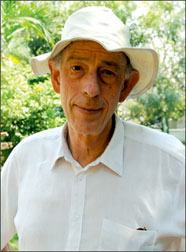Dutch preferred slime over war

|

Dutch historian Dr. Wagenaar Lodewyk |
Whatever be the day and age of any given economic system,
significantly the emergence of an elite group is noteworthy. The
dynamics involved in the rise of civilisations unfold only
civilisational growth devoid of equity.
As a result, what entailed quantitive growth was at the expense of
quality which quality is only realisable only when equity and equality
sets in. This then has been the great misfortune in human history and
regretfully expected to continue in the future as well.
Most precarious now is the misuse of science and technology what with
the nuclear bomb-a damocles sword hanging over mankind threatening even
his extinction.
If a levelled playing field in equity was not attainable despite
knowledge advancement, disgustingly the nuclear bomb will be that great
leveller where the two highly polarized entities of elitism and
marginalization will cease to exist - the great prophecy of all religio/social
reformers.
Otherside
Interestingly if not for opportunities confronted by these elitists
in upward social mobility and a link up with a fast growing world
economy, they in their countries would have remained social non-entities
with a caste based feudal economy placing them somewhere down the social
ladder.
According to Dutch historian Dr. Wagenaar Lodewyk, significantly the
rise of the karawa caste in the Dutch stronghold of Ceylon's maritime
provinces following the king's isolated state uphill saw this socially
dislodged group evolving from fishermen to transporters to contractors.
They comprised Ceylon's emerging elite all along its central belt
breaking the chains of the downtrodden. While the upper caste Kandyan
peasantry remained where they were, the karawa caste became part and
parcel of the new economy through Dutch held new riches.
"So to keep saying 'these blady colonists is too easy. So, its still
strange to hear that foreigners came and that they only exploited-all
this is one's own viewpoint and a ridiculous one at that," said Dr.
Lodewyk and hastened to add, "In the complicated nature of exploitation
by foreigners, the willing and unreserved help of Ceylonese cannot be
overlooked.
All profited-the invaders and the invaded and all Sri Lankan profited
by entering the new global economy."
Exploitation
Equipped with an unbounded knowledge of this country's history, a
side long glancing Dr. Lodewyk sarcastically continued, "To say these
European occupied this country - Yes, exploited our country Yes, these
people only have profited - No because exploitation and profit was
unthinkable if there was no profit on the other side.
Was it the average farmer, the moor, the chetty, the Eurasian or are
we talking of a Sinhala coastal elite or cinnamon peelers or the karawa
who formed the new economic reality? The question is, if we talk of
profit and exploitation, how do we look at it?
Therefore, the reference 'blady colonists' is too easy. So this is
why I say if not for the willing help of Ceylonese, exploitation would
not be possible. All profited and entered a new global economy."
Dr. Wagnaar's explanation gave writer insight into happenings at
macro level. If the hatmen that formed a part of the economic elite of
colonial times, the post colonial system was not very different.
The hatmen have significantly shared the cake both nationally and
internationally in the global economic system. There's no better proof
to this than these elitists' existence in both these two areas. The
global political economic system's unjust continuity arises from a world
hegemony of powerful states comprising international elites ably
supported by national elites.
Valuable services
Referring to the 'hat men' of Dutch times, Dr. Wagnaar also noted
their valuable services in transferring traditional rural people in
paddy lands to labour in the coast significantly on new coconut and
cinnamon plantation in 1769 only to be dependant on the new economic
elite.
It could be argued how a self dependant people living in their
traditional villages were reduced to labouring for a new elitist class.
The traditional slash and burn cultivation (chena) was halted as Dutch
interests grew in large scale cinnamon and coconut cultivations.
Thus the transformation from a self sufficient home based subsistence
agricultural setup, these rural folk moved into coastal areas to slot
for the new economic elite - collaborative outcome of the Dutch and
local elite.
Dr. Wagnaar argues the Dutch could not have come here and carried out
their agenda if not for the local 'hatman's' support whose co-operation
he believes was in abundance-indeed some food for thought to those that
scream, 'down with imperialists.
It is as a result of foreign power arrival in Ceylon that today we
see men and women into power seeking which chance was a total denial
under a caste based feudal economy where only caste decided one's
lifetime occupation.' However, of all these alien powers, the Dutch it
could be argued were the most slimy and relatively least exploitative -
certainly reflective in Ceylon's administrative pattern under them.
Each time the Dutch governors stationed in Ceylon wanted to go to war
with the kings, the authorities instructed them to use maximum slime to
avoid the costly exercise of war.
So to this end they worked tirelessly. In fact, in 1753 they even
projected being champions of Buddhism by bringing in Buddhist Bhikkus
from Thailand.
They bowed, worshipped and venerated the king, said 'yes', yes, yes'
to all what he said and did, yet come 1766 following the king having to
cede the entire maritime province when the king became virtual prisoner
uphill, the Dutch specifically introduced a conditional clause of 'no
kneeling before the king anymore' a typical stoop to conquer
application.
Dutch slime was also revealed when in 1656 having driven the
Portuguese from the country back tracked on their word of honour,
refusing to quit despite the king's request to do so.
"We have invested lots of monies to chase your enemies, please pay
the debt. Then we shall leave," they said referring to the 7 million
gilders war cost approximately three and a half million Euros.
Slime coupled with conditionality seemingly a Dutch strategy in
colonial administration is further evidenced when examining what led to
their eastern advance.
Come 1652 when the Portuguese re-captured Brazille, the Dutch
retaliated, the war that followed between these two parties in Asia made
Dutch conditionality turn the course of history for them as well as
Portuguese interests in this part of the world." If you take Brazille we
will take all of your Asian possessions," was the Dutch threat to the
Portuguese.
This coupled with the timely invitation of Ceylon's monarch to the
Dutch to rid the Portuguese led to the Dutch invasion of Colombo in
1656. Advancing their war strategies they also captured Cochin,
Nagapattanam and Tuticorin as safeguards to their Eastern possessions
including Ceylon. |
